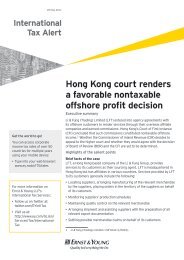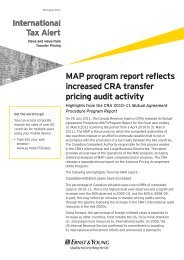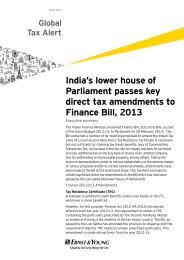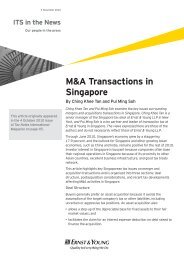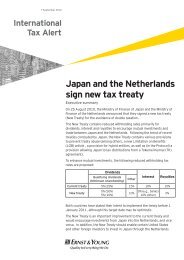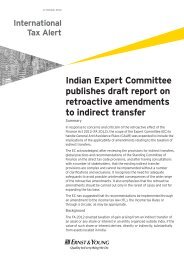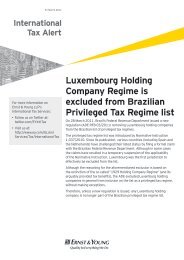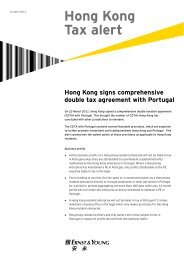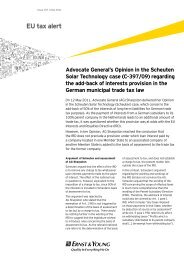Download - Ernst & Young T Magazine
Download - Ernst & Young T Magazine
Download - Ernst & Young T Magazine
You also want an ePaper? Increase the reach of your titles
YUMPU automatically turns print PDFs into web optimized ePapers that Google loves.
Credit: Philippe Schlienger<br />
Human Age. This is a complex new era in which<br />
companies will have to embrace new work<br />
models, people practices and talent sources to<br />
ensure future success. In order to unleash their<br />
potential, companies will need to engage with<br />
their people on a deeper, human level. Individual<br />
needs will determine recruitment and<br />
development strategies. Companies will need to<br />
provide an environment suitable for collaboration<br />
and to anticipate more precisely the skills that<br />
they’ll need.<br />
When we first discussed these ideas at the<br />
2011 World Economic Forum in Davos, many felt<br />
that they were interesting. Since then, there has<br />
been continued social, political and economic<br />
turbulence. This year in Davos, we noticed that<br />
more and more companies are seeing the impact<br />
of these changes. Business leaders realize, for<br />
example, that there is a shortage of good people,<br />
that they don’t have the right people to develop<br />
the right strategy and that there is skill mismatch<br />
in key markets.<br />
What does the future hold for expatriate<br />
managers?<br />
We see fewer and fewer companies today looking<br />
for expatriate managers. They are not<br />
sufficiently or deeply connected to the markets<br />
in which they operate. The old idea where<br />
managers from developed countries go in and<br />
show the locals what to do is finished.<br />
Increasingly, we see what we call the “reverse<br />
expat” phenomenon. This approach rotates a<br />
local manager, based in the emerging market,<br />
through functions outside the home market. The<br />
manager can then adapt the experiences gained<br />
from this to the local market upon their return.<br />
The reverse expat approach is also a<br />
particularly powerful way to enhance retention<br />
of local talent because it allows employees in<br />
emerging markets to see that the company is<br />
truly global. If you are sitting in a business in<br />
Asia, for example, and you can see some Asian<br />
counterparts who have been promoted and are<br />
now running pieces of the business, it makes a<br />
big difference to the overall level of employee<br />
retention, particularly when it comes to key<br />
talent. Seeing that the top echelons of<br />
management are not just dominated by the<br />
parent country management team provides<br />
reassurance for ambitious local managers in<br />
these markets.<br />
How can companies balance local<br />
responsiveness with global economies of scale?<br />
I think many companies struggle to get a balance<br />
between being aligned globally but also being<br />
sensitive to appropriate local interpretation.<br />
Companies need to have global collaboration but<br />
they also need to be anchored in the local<br />
market. Some company programs will be applied<br />
systematically in all markets; others can be<br />
adapted to the needs of the local environment.<br />
There is a lot of complexity here, and managers<br />
Rise of the reverse<br />
expatriate<br />
One of the trends that<br />
Manpower’s Françoise Gri<br />
is seeing in the market<br />
is the rise of the “reverse<br />
expat”, in which a local<br />
manager from an emerging<br />
market is rotated through<br />
functions outside of their<br />
home market.<br />
have a new level of responsibility to implement<br />
this quickly, efficiently and in the right way.<br />
At ManpowerGroup, we have developed<br />
frameworks to help the company find a balance<br />
between local and global. The framework has two<br />
major components to it: one fixed and one<br />
flexible. The fixed part consists of processes that<br />
are non-negotiable, whether you are in Istanbul<br />
or Buenos Aires. In those instances, the local<br />
company needs to operate according to this fixed<br />
template, no matter what. Then there’s a flexible<br />
component, where managers can localize the<br />
program to the needs of the local market.<br />
Creating those frameworks has increased our<br />
speed tremendously because it has taken a lot of<br />
the mystery out of who’s accountable for what.<br />
Is technology changing the nature of work?<br />
It is difficult to understate the likely impact of<br />
technology on the workforce. Technological<br />
developments allow new ways of getting work<br />
done, which increase the importance of<br />
co-ordination and collaboration. Rapid<br />
communication via online networks, for example,<br />
is changing organizations’ choice of where, when<br />
and how work is performed. Social networks are<br />
pervasive, but research suggests that only 30<br />
of executives understand the implications of this<br />
new, data-intensive, social network-intensive<br />
world. This is a big challenge. We have had waves<br />
of technology before, but I think the impact<br />
today is much more subtle, while no less<br />
important. It has therefore become crucial to<br />
understand the human dimension, to adapt and<br />
respond to this changing technology.<br />
How important is diversity?<br />
I am a strong believer in diversity. It isn’t just<br />
about hiring on the basis of gender, religious<br />
persuasion or culture. Without genuine diversity<br />
of thought and representation, you’re not going<br />
to come up with the right answers. It’s just too<br />
complex to have a purely British team, for<br />
example, running a global company.<br />
As part of that drive for diversity, we need to<br />
have more women involved in business,<br />
particularly given the talent supply challenges<br />
and talent mismatch problems we see. The<br />
female talent pool is still largely untapped. I think<br />
involving women more in the labor market and,<br />
in particular, at senior leadership level, will help<br />
companies to access the right talent to succeed.<br />
In addition, female executives can bring new and<br />
valuable perspectives to the leadership team.<br />
This kind of change does not come about on<br />
its own, however. You have to fight for it. I think<br />
companies are slowly making progress on this<br />
front, but not enough. Much more still needs to<br />
be done. Looking to the future, I think the<br />
companies that will do best in the new and<br />
evolving workplace of tomorrow are those that<br />
have dealt with diversity for a long time<br />
and that have embedded it into their values and<br />
culture.<br />
<strong>Ernst</strong> & <strong>Young</strong> Issue 07 T <strong>Magazine</strong> 21



